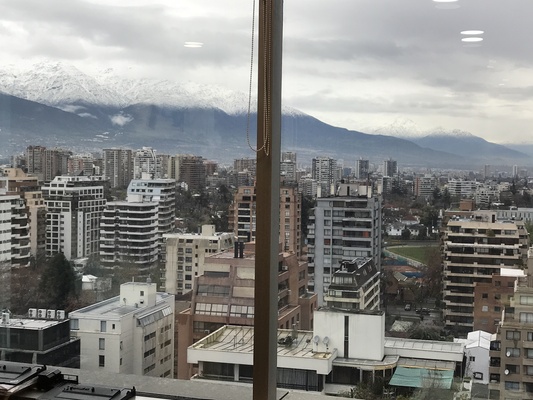- Despite Chile’s relative economic stability and high “ease of doing business” ranking, the companies we visited seemed hampered by recent waves of heavy-handed consumer protection laws.
- Chile has spent 12 of the last 16 years under a Socialist president, and the prior 17 years under a free-market military dictatorship. Its regulatory framework is a product of two opposing systems, and its businesses have had to be adaptable.
- While Chile has historically been a self-contained market, we saw companies modifying their business offerings to compete abroad, with Peru and Colombia high on the list of expansion markets. Several of the management teams we visited were actively trying to diversify their shareholder base internationally.
My first visit to Chile took place during the gray of winter. For someone accustomed to the street debris, smells, and graffiti of San Francisco, Santiago’s spotless pavements were a welcome surprise. Impeccably dressed office workers navigated the afternoon drizzle under rows of black umbrellas. In the background, respectable office buildings punctuated a view of the pristine, snow-capped Andes.
In many respects, Chile is a model of self-contained order. The World Bank ranks Chile a respectable 57th out of 190 economies in ease of doing business, among the highest rankings in South America.1 Chile’s gross domestic product (GDP) per capita is the highest among South American countries, thanks largely to the free market reforms instituted in the 1980s. My superficial observations were certainly consistent with this image of Chile as a wealthy, pro-business economy.
Yet, the serene monochrome view conceals tensions that Chile’s companies are experiencing under recent regulatory changes. After emerging in 1990 from 17 years of military rule and enforced free markets under President Augusto Pinochet, Chile has had a Socialist president for 12 of the last 16 years. A lot of newer legislation reflects concern for individual consumer rights at the expense of businesses. As one example, Chile’s private health insurance premiums have been effectively frozen in place for years. This is because plan participants can legally take their insurance providers to court for raising premiums, reliably win, and bill the insurers for legal fees.
Against this pro-consumer backdrop, it is perhaps not surprising that management meetings carried an undercurrent of frustration. However, the companies we met with had not only adapted to the peculiarities of their domestic market, but were significantly expanding their businesses to places like Peru and Colombia. Of the eight companies we met with over two days in Chile, each one was actively growing its international sales through a combination of direct operations and exports. These managers typically cited convenient geographic proximity, under-served markets relative to Chile’s, and oftentimes more relaxed regulations. One bank succinctly characterized its Peruvian experience as “Chile 20 years ago.”
Two companies we met with on this trip illustrate such resourcefulness in the face of regulatory impediments. The first was a private pension operator (known in Chile as an AFP) that was facing both regulatory challenges and a public perception backlash. AFPs are a direct legacy of Pinochet-era pension privatization, and have been credited with helping Chile side-step billions in public pension liabilities. “The Chilean model” has been held up as a model of success and copied by pension reformers globally, but domestically, AFPs are often viewed as nefarious entities, profiting at the expense of consumers. They are also adjusting to multiple rounds of regulation. The industry weathered a first wave of reforms in 2008 that introduced a bidding process for new plans based solely on commissions, and increased payouts to low-income workers through a public-private “solidarity scheme.” In the same week as my visit, President Michelle Bachelet floated another proposed package of reforms. One measure addressed the pension shortfall through a mandated 5% employer salary contribution. But several others only added to the administrative burden – for example, proposing the formation of a new Collective Savings Council to manage employer contributions, in lieu of the existing AFPs.
While supportive of initiatives to close the pension shortfall, the management team at the AFP expressed concern about the efficacy of more government councils that would need to be funded by tax dollars. Still, this AFP was ready to cooperate on regulatory changes and had focused internally on consumer education. More importantly, the company had extended its pension operation into Peru where it had already established itself as the market leader.
We also met with a bottling company facing what may be permanent and structural headwinds in its home market. Domestic sales had declined markedly since 2015, when Chile passed a law requiring companies to print prominent health warnings on food and beverage packaging. Since then, this company’s cola bottles have featured black stop sign-shaped labels warning consumers that what they were about to consume was “Alto en azúcares” (high in sugar) and “alto en calorías.” Similar labels exist for salt and saturated fat, leaving most food kiosks and grocery stores awash in black octagons. Still other rules made it illegal for food companies to sell unhealthy foods in schools, or advertise to children under the age of 14. Interestingly, we noted that no such black stop signs were displayed on cigarette packs or liquor bottles.
This company had been able to recoup a portion of its sales by switching to artificially sweetened beverages, which do not require health warnings, and also enjoy lower sales tax. The net effect of this partial substitution toward artificial sweeteners may have been questionable for consumer health, but was unfortunately still a clear negative for cash flows. This management is now hedging its bets geographically by investing in a new facility to enable a lower price point product for neighboring Brazil, which operates without the same consumer protections. And when its beverage partner was slow to introduce alternatives to sugary soda, this bottler assembled its own R&D task force to import and test beverage alternatives on its own dime. In this way, it assessed local demand for low-sugar juices, flavored water, and premium-branded water, discovering in the process that Chileans were avid consumers of Smartwater – known here as “the water of Jennifer Aniston.”
Departing from Chile, I was impressed by the ability of these companies to look past the regulatory uncertainties and beyond their own borders in search of growth. Perhaps a few of them shared my question – can there be a black stop sign for excessive government intervention?
Stephanie GanSantiago





- The views and information discussed in this commentary are as of the date of publication, are subject to change, and may not reflect the writer's current views. The views expressed represent an assessment of market conditions at a specific point in time, are opinions only and should not be relied upon as investment advice regarding a particular investment or markets in general. Such information does not constitute a recommendation to buy or sell specific securities or investment vehicles. It should not be assumed that any investment will be profitable or will equal the performance of the portfolios or any securities or any sectors mentioned herein. The subject matter contained herein has been derived from several sources believed to be reliable and accurate at the time of compilation. Seafarer does not accept any liability for losses either direct or consequential caused by the use of this information.
- The World Bank, “Doing Business 2017: Equal Opportunity for All,” Fourteenth Edition, 2017.
![[Chrome]](/_layout/images/ua/chrome.png)
![[Firefox]](/_layout/images/ua/firefox.png)
![[Opera]](/_layout/images/ua/opera.png)
![[Microsoft Edge]](/_layout/images/ua/edge.png)